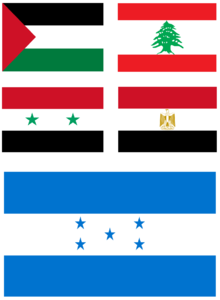Arab immigration to Honduras
الهندوراسيين العرب | |
|---|---|
 | |
| Total population | |
| Various estimates: | |
| Languages | |
| Spanish, Arab, English | |
| Religion | |
Catholicism, Islam | |
| Related ethnic groups | |
| Palestinians, Lebanese, Jews |
Arab immigration to the Republic of Honduras began in the 19th century with the liberal reforms of President Marco Aurelio Soto (1876–1883), who saw immigration as a determining factor in the development of capitalism in Central America, and sought to establish an attractive environment for foreign investment. The largest Arab community in Honduras is the people of Palestinian descent, the majority of whom (95%) are Christian (Catholic and Orthodox). The approximate population of Honduran Arabs is more than 300,000 people, around 280,000 Palestinians and 20,000 Lebanese,[3] estimates place the Muslim population at about 11,000.
History
Background
Relatively few Arabs immigrated to Honduras during the 19th century. Under conservative General Captain
20th century
The early 20th century saw a major increase in Arab immigration to Honduras following
In 1939 the Tegucigalpa Arab community organized the "Society Union Arab Youth" under the leadership of Gabriel Kattán and Nicolás Larach,[12] which led to the founding of similar associations in Cuba, El Salvador, Guatemala, Mexico and Nicaragua. This organization published a weekly newspaper, Rumbos ("Directions"), and produced an exclusive radio program for Radio HRN.[13] In 1968, eight Arab-Honduran members of this Society purchased six acres in a suburb of San Pedro Sula where they built a swimming pool. This eventually grew into the US$15 million Arab-Honduran Social Center complex, which included some 1,600 families as club members by 2001.[4]
Modern day
Estimates placed the
Notable Arab-Hondurans

Despite comprising only approximately three percent of the country's population, Arab Houndurans are major players in the country's economy, politics, arts, and sciences. [citation needed]
Business and politics
- Victoria Asfura, politician and former President of the Central Bank of Honduras[14]
- Miguel Facussé Barjum, founder and president of Corporación Dinant, chief economic advisor 1982-86
- Miguel Andonie Fernández, Ph.D., founder of the Innovation and Unity Party
- Carlos Roberto Flores, President of Honduras 1998-2002
- Juan Bendeck, businessman, politician, and minister
- William Handal Raudales, politician
- Gabriel Kattan, Businessman, politician
- Elías Canahuati, founder of Canahuati Tobacco
- Óscar Kafati, president of El Indio Coffee Mills, former minister of Economic Development[15]
- Juan Kawas, 1898 immigrant and leading importer of wines and spirits[16]
- Salvador Nasrralla, first vice president of Honduras, TV host.
- Fredy Nasser, businessman
- CD Motagua
- Eduardo Atala, current president of CD Motagua
- Alfredo Hawit, president of FENAFUTH
- Margarita Dabdoub Sikaffi, former mayor of La Ceiba
- Nasry Asfura, former mayor of Tegucigalpa
- Jorge Canahuati Larach, businessman
- Mario Canahuati, former ambassador to the United States
- Schucry Kafie, founder of Lacthosa
- Esteban Handal Pérez, politician
- Ricardo Jaar, businessman
Cinema and television
- Sami Kafati, film director
- Fosi Bendeck, film director
- Michael Bendeck, film producer
Science
- Roberto A. Dabdoub, Biologist
- Kerim Gattas Asfura, Chemist
- Jeannette Kawas, Environmental activist
See also
- Immigration in Honduras
- Spanish migration to Honduras
- History of the Jews in Honduras
- Italian migration to Honduras
- Honduras–Palestine relations
- American immigration to Honduras
- Islam in Honduras
 Honduras portal
Honduras portal
Notes and references
- ^ "Los árabe-hondureños, un ejemplo de comunidad exitosa". Al-Manar. Retrieved 12 May 2021.
- ISBN 978-84-613-6700-9. Retrieved 25 April 2021.
- ^ ISSN 1018-0583.
- ^ a b c d Luxner, Larry (July–August 2001). "The Arabs of Honduras". Saudi Aramco World.
- ^ ISBN 0472064940.
- ^ Luque, Chalo (1915). Memorias de un sampedrano (in Spanish). G.R. Luque. pp. 61–64.
- ^ Posas, Mario (1993). Breve historia de la ciudad de La Ceiba (A Brief History of La Ceiba) (in Spanish). Alcaldía Municipal de La Ceiba, Secretaría de Cultura. pp. 14–15.
- ^ Ley de Inmigración, Decreto No. 101 (Decree #101: Immigration Law) Honduras Gazette, No. 7,860, 2 Apr 1929.
- ^ ISBN 9789977675879.
- .
- ISBN 9780820481111.
- ^ "Semanario". Rumbos. Vol. 1, no. 16. 1 Jul 1939. p. 1.
- ^ The Arabs and Palestinians in Honduras, 1900-1950, Publisher Guaymuras, Tegucigalpa, Honduras, 2000. (Page 78)
- ^ "Victoria Asfura". Diario La Tribuna Honduras. 16 October 2014. Archived from the original on 24 February 2017. Retrieved 23 February 2017.
- ^ "Fallece el empresario del café Oscar Kafati". Tiempo.hn (in European Spanish). Tiempo Digital (Honduras). 24 September 2015.
- ^ "History". Juan N. Kawas & CIA.
Bibliography
- Amaya Banegas; Jorge Alberto (1997), Los Árabes y Palestinos en Honduras (1900 - 1950) [The Arabs and Palestinians in Honduras], Tegucigalpa: Guaymuras, p. 159, ISBN 99926-15-51-6
- Euraque, Dario A. (1996) State, Power, Nationality, and Race in the History of Honduras. Editiones Subirana, Tegucigalpa, Honduras.
- Olga Joya and Ricardo Urquía. 1983. State Interventions in the Economic Development of Tegucigalpa, Thesis, History Department UNAH
- Pastor Fasquelle, Rodolfo. Biography of San Pedro Sula, 1536-1954. Centro Editorial, San Pedro Sula, Honduras; 1990.
